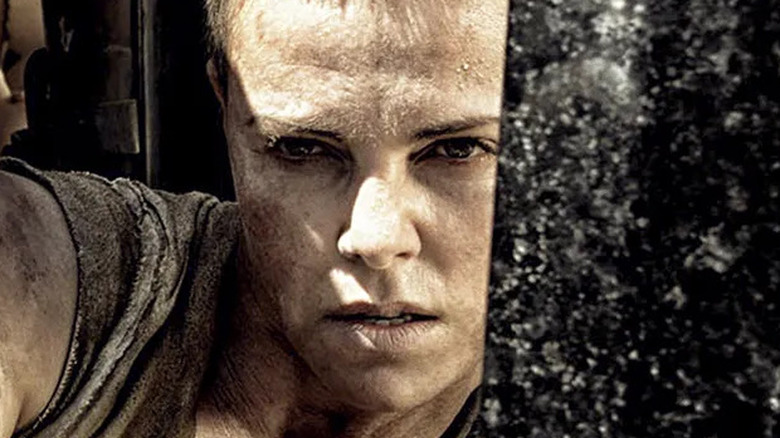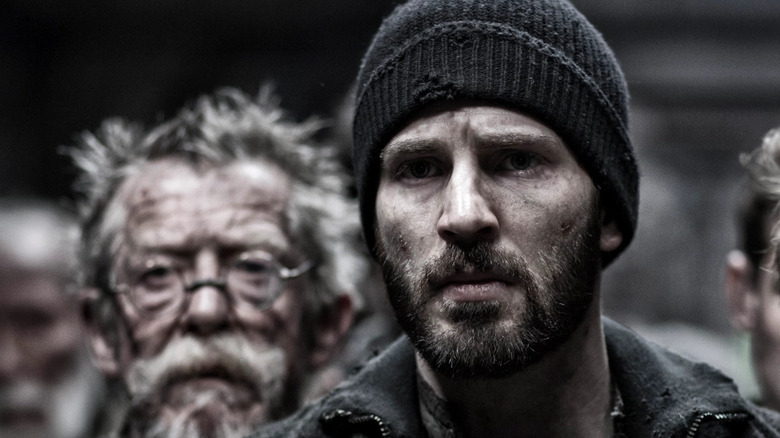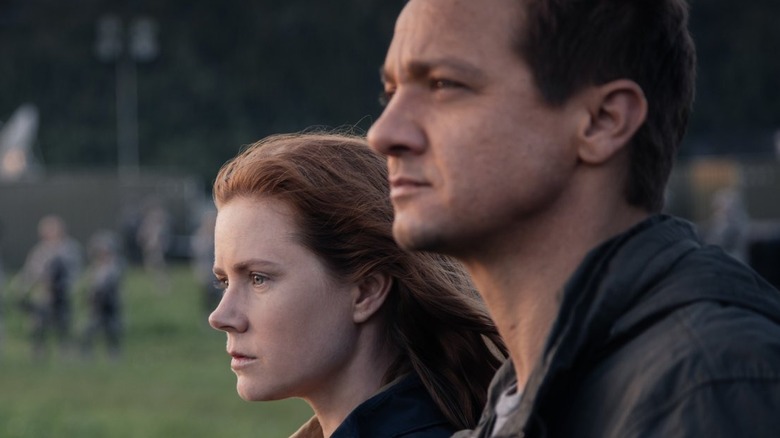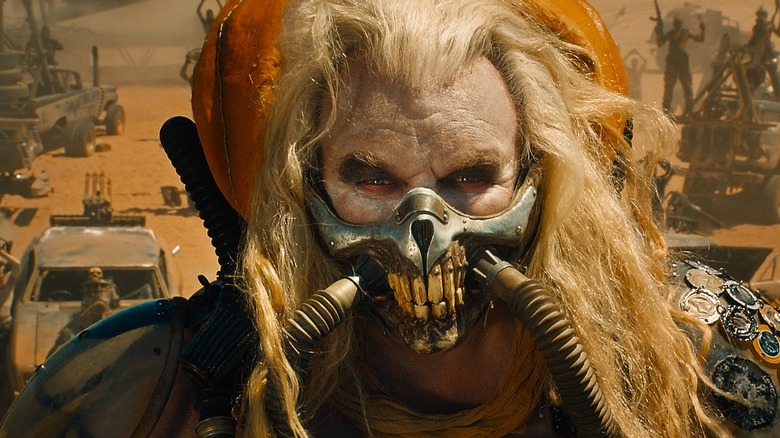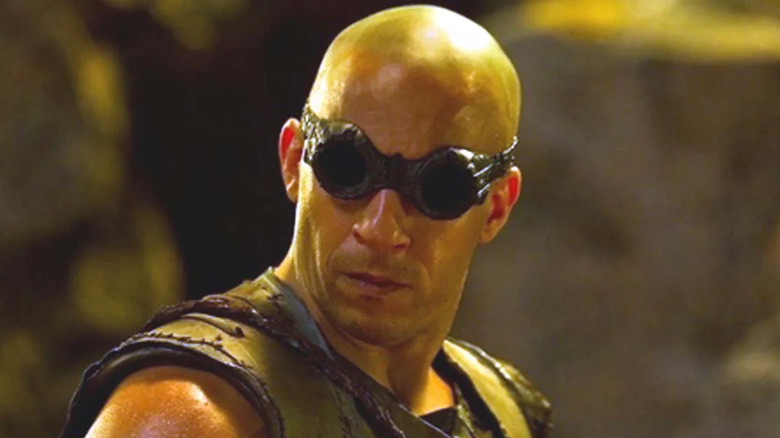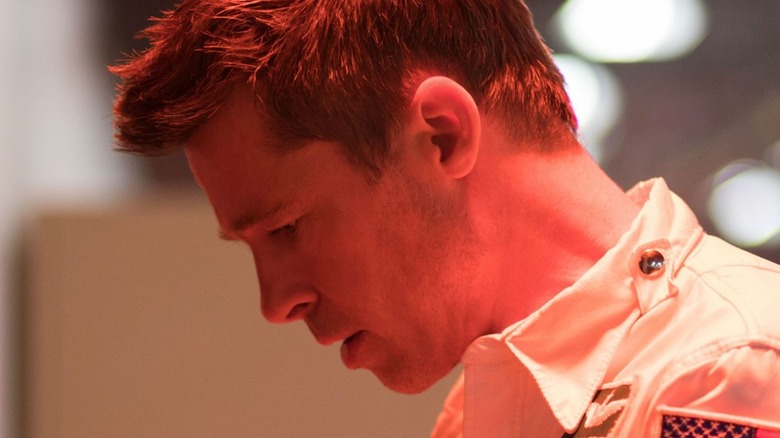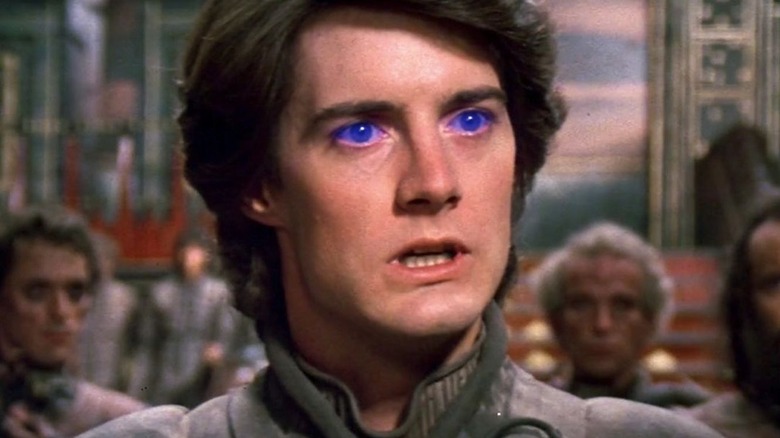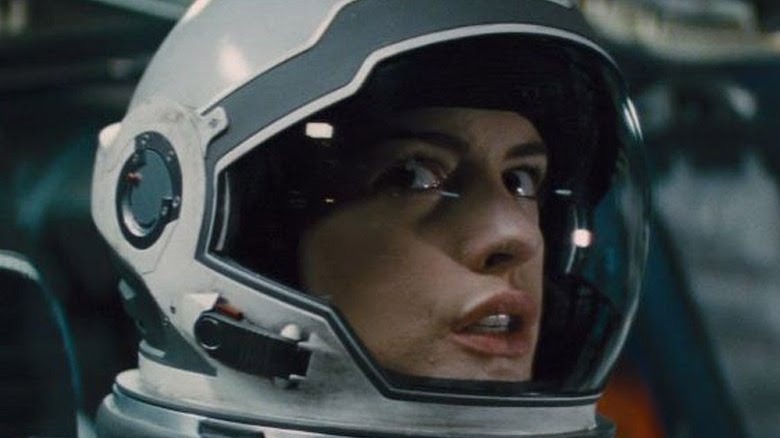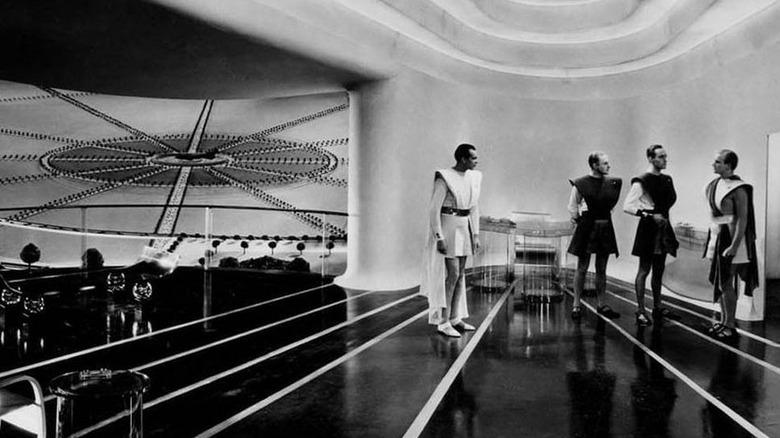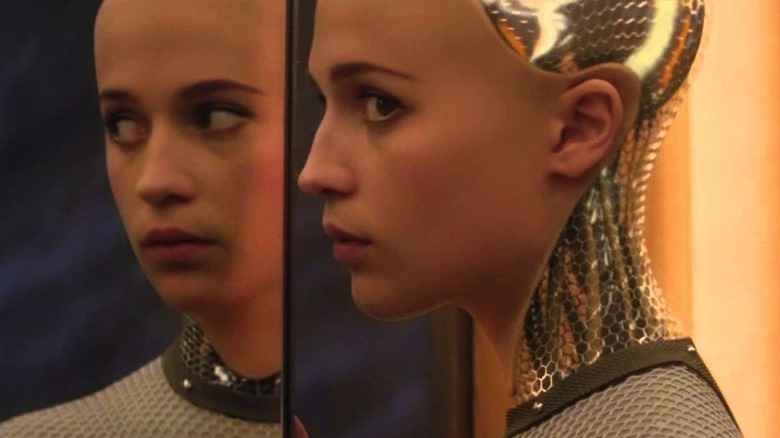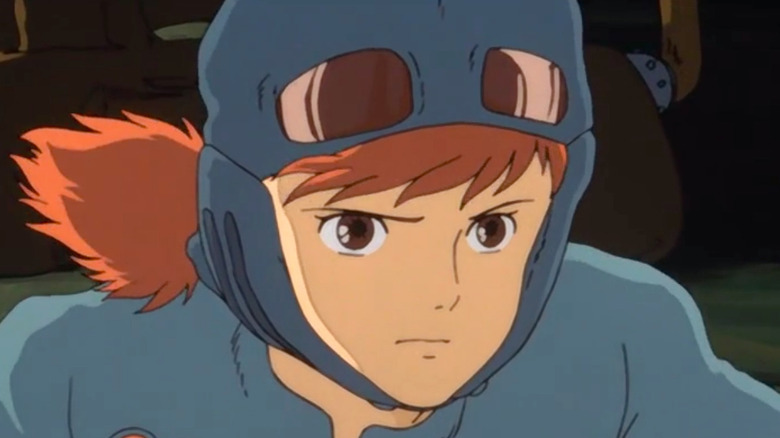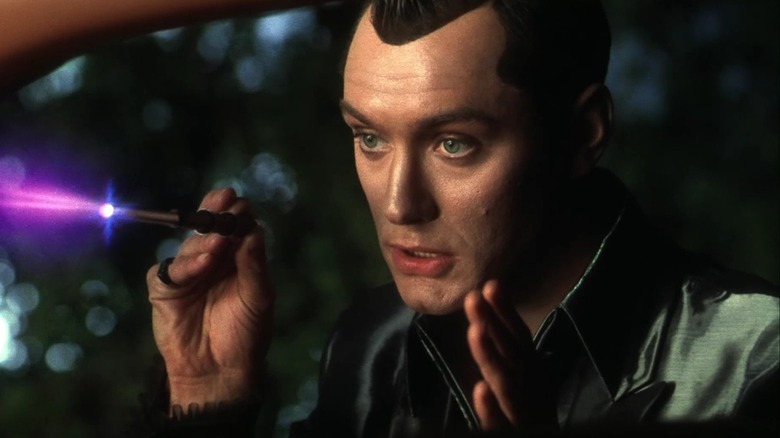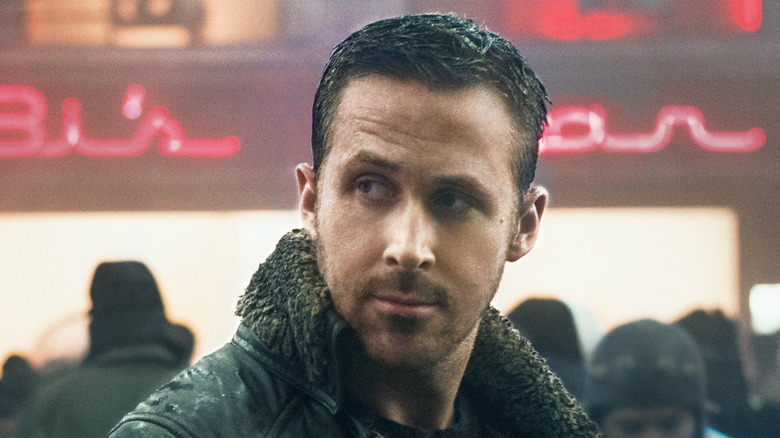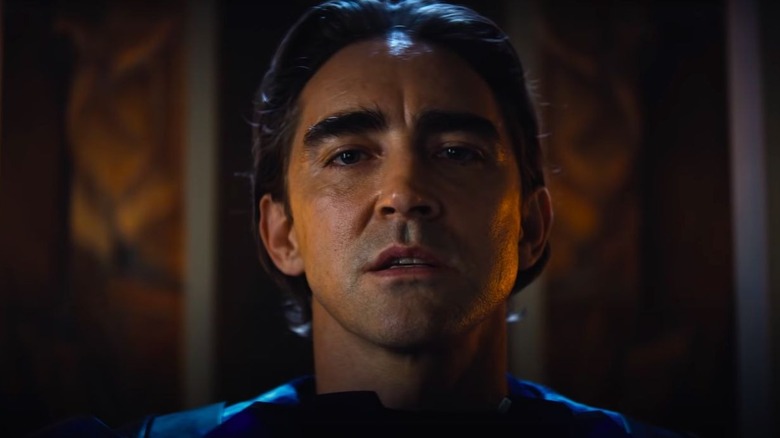Movies Like Dune That Sci-Fi Fans Need To Watch
The 2021 sci-fi saga "Dune" is enthralling moviegoers in theaters — and at home, where it's streaming on HBO MAX for a month — and fans are waiting with bated breath for the sequel that has already been green lit by Warner Bros. It's a sprawling tale that managed to take the seemingly impenetrable novel and translate it to the screen faithfully and accurately, not just in story but in scope. It delivered all of the grand ideas at work in Frank Herbert's book, and didn't rush through plot points to get to an exciting climax. It took its time laying the groundwork for a complex cast of characters and slowly built the world around them, immersing the audience in a tale of warring planets, rival families, and Shakespearean drama.
"Dune" is a thoughtful, intense, sometimes somber story of interstellar politics, with understated performances that stand out against the lush landscapes and sweeping imagery. It's a lavishly made film that tells an epic tale that's both enormous and intimate at the same time. Movies like that are not a dime a dozen, and it may seem like an impossible task to find anything like it out there to enjoy. But don't fret, we think we can help.
While you wait for "Dune: Part 2," here's a list of visionary sci-fi films that fans should check out.
Snowpiercer
If you're looking for a movie like "Dune" with a bizarre vision of the future — a unique, remarkable setting with a dark tone — Bong Joon-Ho's "Snowpiercer" is for you. Adapted from the dystopian graphic novel "Le Transperceneige" by French creator Jacques Lob, the story is set aboard a seemingly endless train that continually circles the globe. The world is covered in snow and ice after an apocalyptic environmental disaster, and all that remains of humanity is now relegated to life aboard the "Snowpiercer" locomotive.
In this allegory about class struggle, the front of the train is where the wealthy and upper class live in luxury, while the lower classes get poorer the further back on the train you go, with worse and worse conditions towards the end of the train. In the last cars, we meet Curtis, Gilliam, and Edgar, who lead an unprecedented uprising against the wealthy and must fight their way to the front of the train to take down Minister Mason, the leader of the mobile civilization. Much like "Dune," "Snowpiercer" boasted a star-studded cast featuring Chris Evans, John Hurt, Jamie Bell, Ed Harris, Octavia Spencer, and Tilda Swinton. It received rave reviews upon its release, and was further adapted into a television series that continued to expanded on its post-apocalyptic world.
Arrival
Intense, emotional science fiction seems to be Denis Villenueve's bread and butter, and his first major stab at the genre was 2016's "Arrival," starring Amy Adams ("Man of Steel") and Jeremy Renner ("Hawkeye"). It's a story of an alien invasion of Earth, but you won't find any Roland Emmerich-style "end of the world" scenarios, or Michael Bay-esque explosions and battle sequences; instead you'll get quiet introspection and thoughtful character drama, as Adams' character, a top scientific linguist, is tasked with deciphering the bizarre communications that are received when an alien race unexpectedly arrives on Earth.
Like "Dune", the movie pulls the audience into the story with big ideas, awe-inspiring imagery, and powerful, understated performances, rather than the slick, attention-grabbing excitement of more conventional fare. Villenueve somehow makes the heartbreaking and inspirational "Arrival" both epic and small scale at the same time, with a flare for the dramatic that doesn't need over-the-top action sequences to still bowl you over. In its review, the Hindustani Times said the film hits you with "a blow so devastating that you will find yourself gasping for breath ... right up until the its final moments." Just Villeneuve's second major Hollywood film (after "Sicario"), "Arrival" illustrated the director's ability to handle weighty material with heart and scope, and made audiences take notice of the industry's newest filmmaking luminary.
Mad Max: Fury Road
A bit more of an adventure film than Villenueve's "Dune," the 2015 "Mad Max" reboot nonetheless puts the same kind of focus on soulful characters and breathtaking visuals that help set it apart from other post-apocalyptic movies. In this modern update to "Mad Max," director George Miller returns to the franchise he created in 1979 and amps up the stakes, cranking the intensity dial up to 11 and giving audiences nothing less than one of the best films of the decade.
From its opening, "Mad Max: Fury Road" has an energy that's unmatched by its peers, even in its slower moments. Max himself (Tom Hardy) plays a surprisingly smaller role than anticipated, with the practically unrecognizable Charlize Theron getting the spotlight as the haunted, robot-armed drifter called Imperator Furiosa. On a quest across the endless desert to free herself and a band of slave women from the clutches of the nefarious Immortan Joe, Furiosa stumbles upon Mad Max, who agrees to help her in her mission. George Miller proves once again what a brilliant filmmaker he is, building an impressive world that requires surprisingly little exposition, and a cast of characters often portrayed with little more than facial expressions. It's a fairly simple, straightforward story that is essentially one long chase, but it's a visceral, twisted vision of a horrific future landscape, and a true masterpiece of cinema.
Riddick
If you are looking for something with a little more action and excitement, "Riddick" might just be the answer. The third in a series of films starring Vin Diesel ("Pitch Black" and "The Chronicles of Riddick" were the first two), the film concluded the "Riddick trilogy" after a hiatus of nearly a decade. Like "Dune," the film is set in a world with a complex mythology, but it doesn't spend too much time dwelling on it. It gives us just enough to keep up, especially important for those looking to view this entry as a standalone — which you might want to, as it glosses over the events of the first two films.
Distinctly more thrilling in its intent, "Riddick" is decidedly less thoughtful and intimate — and more swift in its pace — than most entries on this list. It still remains exciting science fiction, with an outer space outlaw anti-hero at its center rebelling against an unjust imperial system, only with a smaller scope: this is one man alone in a harsh environment, left behind by a world that wants his rebellious spirit eliminated.
Also in the film are Dave Bautista ("Dune") and Bokeem Woodbine ("Spider-Man: Homecoming") as bounty hunters out to kill Riddick, while Katie Sackhoff ("Battlestar Galactica") and her team of hunters attempt to take him alive. It may not be a slower-paced, breathtaking epic like "Dune," but it remains great galactic movie-making from the faster-paced end of the spectrum.
Ad Astra
It won't thrill you in the ways that "Riddick" will, but if you're looking for a true science fiction experience with heart, "Ad Astra" delivers. It's a somewhat more down-to-Earth, earnest story that follows astronaut Roy McBride (Brad Pitt), who gets word of a mysterious signal coming from a station near Neptune that just so happens to be the last known coordinates of his father (Tommy Lee Jones). Lost years before on another mission to find intelligent life beyond our solar system, Roy now goes on a mission to find his father — and stop a possible attack on Earth. As the planet is bombarded by disasters that some see as the wrath of God, the film ventures into religious allegory too, plummeting the viewer into a deep, emotionally impactful story about a man's search for meaning.
Visually breathtaking and full of some truly great technical marvels of filmmaking, "Ad Astra" is ultimately a character drama that explores issues of family, lineage, and legacy. Some have said "Ad Astra" ranks among Pitt's finest performances, but it was sadly overlooked on its release, perhaps for the crime of not being the action movie that many may have expected from the Hollywood star. With the slower, more reflective "Dune" finding appreciation from audiences, this one deserves a serious second look.
Dune (1984)
Don't let Denis Villenueve's new film keep you away from the first interpretation of Frank Herbert's acclaimed science fiction saga. Directed by auteur avant-garde filmmaker David Lynch — who had just a year previously turned down a chance to helm "Return Of The Jedi" — it stars Kyle McLachlan, Patrick Stewart, Sean Young, and rocker-turned-actor Sting. It may seem like normal sci-fi fare by today's standards but at the time it was seen as highly unusual, perhaps even downright bizarre, for a mainstream film, which is possibly why Lynch was selected to helm.
This earlier version of "Dune" succeeds at portraying the kind of vast scope and wild ideas that were groundbreaking for the genre at the time, and unlike many sci-fi adaptations of the '70s and '80s, it embraces many of the novel's most bizarre elements, too. The cast stands out with intense (sometimes over-the-top) performances that fit the film's style, and it's also notable for being the movie that introduced Lynch to MacLachlan, who he'd later cast in the iconic role of Dale Cooper on "Twin Peaks."
Be warned though, the 1984 version adapts the entirety of the first novel, so if you don't want some spoilers for "Dune: Part 2" maybe steer clear for now. It's very different in tone than Villenueve's take, but worth seeing on its own merits. If you stay away from the 2000 Sci-Fi Channel miniseries version of "Dune," though, that much the better.
Interstellar
Christopher Nolan's 2014 epic science fiction masterpiece "Interstellar" is arguably the modern era's answer to "2001: A Space Odyssey." In this space-faring drama, the Earth has become stricken by environmental disaster and climate change, and humankind seeks to colonize another planet. One of Earth's last-ditch attempts to locate a habitable world is a manned mission through a wormhole recently discovered near Saturn that will take them to deep space, where humanity might find a suitable place to call home. Led by astronaut Joseph Cooper (Matthew McConaughey) and scientist Amelia Brand (Anne Hathaway), the crew searches three separate planets, each with unique and distinctive properties.
This may seem like a starting premise for a thrilling galactic adventure, but "Interstellar" explores much more than outer space, delving into topics of fate, mortality, love, and family, with Cooper's strained relationship with his resentful daughter providing the heart and soul of the film. Visually sumptuous and thematically dense science fiction, "Interstellar" is Hollywood filmmaking at its finest, a tour de force of powerful performances, jaw-dropping effects, and plenty of surprises along the way.
Things To Come
"Things to Come" was written by H.G. Wells and adapted from his own book, presenting a terrifying vision of the future unlike anything audiences had ever seen in 1936. But don't let its age deter you: It's every bit as epic as movies released today, even if the production itself is a bit dated. It tells of a global war that breaks out in the 1940s and rages on for decades. A final biological weapon strike wipes out nearly half of the world's already dwindling population, plunging those left into a nearly pre-industrial state. Eventually, the movie's hero, John Cabal (Raymond Massey), arrives in a small surviving community, claiming that an advanced new world is being rebuilt in the Middle East. The film then flashes forward another hundred years to a new, technologically advanced civilization where a sect of neo-Luddites fears that newly emerging space flight technology could lead mankind to another global war.
Expansive in its scope, "Things To Come" was perhaps a bit too prescient, written before both world wars and warning of the dangers of unchecked technological progress and a space race that eventually came to pass. A contemporary review that appeared in The New York Times upon its release called it "pessimistic, frightening, and inspiring," ultimately concluding that "true or false, fanciful or logical, it is an absorbing, provocative and impressively staged production."
Ex Machina
Essentially a character study, "Ex Machina" updates audiences on many of the same themes as "Blade Runner." The film by "28 Days Later" and "Sunshine" writer Alex Garland stars Oscar Isaac as Nathan Bateman, an eccentric Steve Jobs-type who is developing a breakthrough artificial intelligence in the form of a humanoid robot named Ava. Domnhall Gleeson is Caleb, a bright young computer programmer at the company who Bateman brings to his remote estate to help test the very realistic and alluring Ava, played by Alicia Vikander. As the young programmer gets to know Ava he becomes less certain of Bateman: is he a genius a la Jobs, or a monster a la Dr. Frankenstein? Is Ava a pre-programmed, human-like automaton, or merely Bateman's slave? "Ex Machina" ponders these problems and forces viewers down a path of questioning everything they think they know about the human experience.
With show-stopping performances by the trio of Isaac, Gleeson, and Vikander, and a story that combines echoes of "Frankenstein" with fresh, thought-provoking moral dilemmas, "Ex Machina" is science fiction presented as an intimate psychological thriller. Full of surprising twists, it's a cautionary tale of where A.I. and technology could be headed sooner than we might think, making it almost as frightening in its implications for our world as it is a fascinating glimpse into theirs.
Nausicaä Of The Valley Of The Wind
Hayao Miyazaki is one of the pillars of anime and creator of some of the most groundbreaking Japanese animated films in history, such as "Howl's Moving Castle," "Princess Mononoke," and "Spirited Away." But one of Miyazaki's lesser heralded works is "Nausicaä of the Valley of the Wind." Many have compared the 1984 film to "Dune," as it shares many similarities with the space epic, and it's been said that the Japanese animator was directly inspired by Frank Herbert's 1965 novel. It's not hard to spot the many similarities, from ecological allegories and political strife to dream-like prophecies and warrior messiahs.
Set on Earth after an ecological disaster, the film shows us a planet that has become one massive jungle, and home to a race of giant mutated insects — beautiful but dangerous creatures. The story follows the title character of Nausicaä and her epic journey to save the insects from extinction at the hands of two power-hungry empires that are warring over the land and its resources. It's a movie that Michael Mirasol of RogerEbert.com called "Homeric," comparing it to the classic myths of old. Filled with rich characters and a fascinating mythology, it remains Miyazaki's first great work.
A.I.: Artificial Intelligence
If being directed by Steven Spielberg doesn't sell you on it alone, perhaps we should tell you that "A.I.: Artificial Intelligence" was the brainchild of Stanley Kubrick, the visionary director behind some of cinema's most acclaimed films, including "A Clockwork Orange" and "2001: A Space Odyssey." According to The Ringer, Kubrick had been working for decades on turning the Brian Aldiss short story "Supertoys Last All Summer Long" into a film, and by the 1990s he had decided that the project was better off with Spielberg at the helm. Following Kubrick's death, Spielberg would work from the wealth of notes the pair had drafted over the years and direct "A.I.: Artificial Intelligence," the story of a robot child, named David, with the unique ability to express human emotion.
Unlike the space spectacles on this list, "A.I." is a human epic, the story of a robot's quest to understand himself and — like Pinocchio — become a real boy. Set in a time when climate change has ravaged the Earth, the story spans thousands of years, arriving at an eventual future where robots have evolved and humankind is long extinct. It's a truly visionary film with an inspiring message despite its somber tone, though it struggled to find an audience. Perhaps with "Dune" a hit, "A.I." can finally be appreciated for being an emotional, contemplative epic about the search to understand one's existence, and the importance of love and human connection.
Blade Runner 2049
The original "Blade Runner" was based on a short story by noted author Philip K. Dick, and has been seen as a cornerstone of science fiction film for decades. There had long been talk of a sequel, which was usually shot down quickly by both star Harrison Ford and director Ridley Scott. So it came as something of a surprise when "Blade Runner 2049" was announced with "Arrival" (and now "Dune") director Denis Villenueve at the helm, and audiences were rightly skeptical. But the film is an ambitious, awe-inspiring thriller, and the rare sequel made decades later that attempts to one-up its legendary predecessor and actually succeeds.
Methodically paced and luxuriantly shot, "Blade Runner 2049" is nothing short of a visual knockout, and a treat for cinephiles and science fiction fans alike. Built in a world even more fleshed out and richly populated than the original, it gives us Ryan Gosling as "K," a replicant "blade runner" assigned to hunt down rogue replicants. More than just a worthy follow-up to the classic 1982 science fiction neo-noir film, this new entry is a meditative think piece, a new classic that does the impossible — delivering everything fans of "Blade Runner" wanted and more — and adds to the original film's legacy in a way nobody ever expected.
Honorable Mention: Foundation
If you've enjoyed "Dune" on the big screen and are up for a 10-hour movie on a smaller one, then "Foundation," the new series that recently debuted on Apple TV+, might just be what you're looking for. Based on the series of classic novels by Hugo Award-winning science fiction legend Isaac Asimov, the series tells the story of a powerful interstellar empire and a famed scientist named Hari Seldon who, using a new kind of science he calls "psychohistory," predicts its downfall. With the formation of the Foundations — two disparate groups created to save the galaxy — Seldon hopes to use his knowledge of what's to come to preserve and resurrect civilization at some point in the future. Like "Dune," it's a massive epic science fiction saga of warring worlds and interstellar politics, with Jared Harris ("Mad Men") and Lee Pace ("Captain Marvel") leading its astounding international cast.
Described by series creator David S. Goyer as "a 1,000-year chess game between Hari Seldon and the Empire," the series has already been renewed for a second season, with hopes of a lengthy run that could adapt Asimov's original trilogy and beyond. Praised by critics for its lavish production values, vast scope, and impressive world-building, "Foundation" has, like "Dune," taken a series of narratively dense novels once thought "unfilmable" and finally started to do them justice on the screen.
